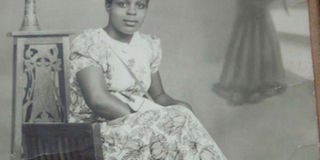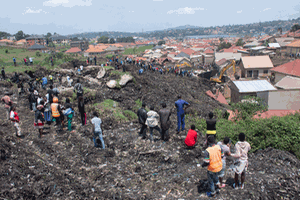Prime
A Voice For Each Decade: Tales from women that lived the years

A younger Teresa Mbiire. Courtesy Photo.
What you need to know:
The best way to appreciate our present freedoms is to look back on the days before we had it. What better way to bring these memories to life than through the voices of the women that lived through years and have had the opportunity to reap the benefits today? They can after all compare now and then.
Tereza Mbire aka Mama Mbire, 78, woman entrepreneur
One of the things that I really treasured back in the days was the innocence love had. In other words, if you fell in love with a man back in the day, it was based on genuine love. Today, it is no longer the case since the majority of women are mainly falling for the money that men have.
I fell in love with my husband back in the days because of the admiration I had towards him and not what he had. The love was purely natural and innocent. This is what eventually saw us have six wonderful children whom we were both able to raise until the time he passed on in 1985.
Parenting
Bringing up children in the past was a lot easier for many women because most stayed home to look after them. Most were unemployed by that time and looking after children became their sort of jobs. I eventually resigned my job as the head of the Uganda Hotels and stayed home to look after my children who are now successful in their various businesses. I realised that if I continued busying myself at work and not giving them time, they would eventually go astray and then it would be too late to put them back on to the right path.
Instead of sitting home doing nothing, I opened up personal businesses that included a bakery, a ready-made garments industry, as well as a flower company.
Finances and business
Because many women back then had little exposure, especially in the areas of education and travel, many failed to get opportunities to work. At the end of the day, many had little or no even source of income.
This was not the case with me however, since I had attained some good level of education at schools such as Butale Girls Junior Secondary School and Virika Teacher Training College. Here, we were often advised as girls to be independent by at least finding somewhere to work or even going ahead to form our personal businesses. It was such advice that prompted me to start my own businesses when I had just quit managing the Ugandan hotels back in the 1990s. It however saddens me to see some of today’s women just seated home doing nothing and yet they have many platforms such as internet to use in order better themselves financially.
Politics
Much as very few women represented us in the LEGICO which we now call parliament, at least I was grateful that their representation was genuine. In other words, when they went to parliament, it was purposely to air out the grievances of the majority of women.
Education
Most girls today deliberately do not want to study take the opportunity for granted, dropping out or running off to stay with their boyfriends. Those days, very few got the opportunity since the perception was that a girl’s place was mostly home and specifically the kitchen.
My mother, however, who was my only surviving parent, struggled to see to it that I went to school. I even went ahead to do odd jobs such as washing for other people in order to top up the school fees. I managed to make it in my education after attaining various certificates and degrees in various fields.
My prayer for every girl is to attain a quality education in order to improve chances of grabbing bigger opportunities in life.
As told to Esther Oluka
Irene Apino, 90, former community development officer
"The rural woman of our generation was better off"
I was one of the pioneer community development officers, whose duty was to sensitise women about basic domestic chores that promoted hygiene and income generating projects among women in Teso during the pre and post-independence Uganda.
The problems the rural woman faces today could be worse than my generation faced. Despite the rare Information communication technology, the community development extension service where I actively participated seemed to be more effective than the ICTs of today.
I’m disappointed in today’s woman
I’m disappointed by the soaring levels of moral decadence and the breakdown in family values, which have been coupled with laziness among the modern women where today, they shy away from practicing agriculture and craft work, activities which empower them economically and ensure the well-being of the families, values the colonial government used to inculcate into the community through the community development extension services.
It is also disappointing that despite the growing number of schooled women, the much hyped modern woman has failed to contain diseases like poverty, malnutrition and ignorance, which are fought at household level, yet my generation without ICTs, performed better.
I used to ride a bicycle distances of over 100km to go and educate women about the importance of basic domestic chores like practicing hygiene, teaching different cooking methods, setting up drying racks for kitchen utensils, building toilets and kitchens as well as teaching them skills in knitting, weaving making pastries,—skills which enabled me to comfortably educate my 12 children.
We were taught in Swahili. My duty was to translate what was taught at school into local languages in the community and wherever I went, women would follow me because they were yearning for information. I used to make wedding cakes which people would book in advance which I would sell and raise the money with which I managed to educate all these children.
About my 12 children and their different fathers
Today you find young girls getting pregnant at an early age. They flock bars very early looking for men. There is no sense of direction for these girls like it was with us where the older generation of women would mentor the young girls to perform domestic chores to enable them grow as responsible women
Even though I also bore 12 children with four different men, it was a situation dictated by my father. I did not even want to produce many children, but we did not have any family planning technologies, so,I did not know how to stop producing. My father never believed in marrying off his daughters for the sake of dowry. He believed that if he educated us, we would be better citizens than being married off. I was his favorite daughter to the extent that he used to comment that had I been a boy, I would have been his heir,” she said.
Profile:
Mzee Apino was born in Omodoi Village in Soroti District on 1st July 1922, to Eria Paulo Engulu, who was a Colonial Chief in Arapai.
Now aged 90, Apino started school in Wiggins Primary School in Kumi District, before joining Kabwangasi Teachers College and later, Arapai Teaching Volunteers Adult Education Center. She is not impressed that the foundation that had been set for women to empower themselves economically and socially got shuttered and the subsequent governments failed to revive.
As told to Stephen Otage
The 70s, 80s through to present day
Beti Olive Kamya Turwomwe
Between 1972 and 1982, I was completing University. I was in a mixed school, Kings College, Budo where dating was like a hobby though teachers did not allow it. I and my group did not mind so much about having sex while relating, it came in much later, not like now where lovers engage in sex the moment they meet. I remember I and my friend were still virgins by the age of 20 and that is the time we joined university. I just related for fun though others could sneak out like after preps to go to the boy’s or girl’s end.
Although this never happened in our family but girls who got pregnant before completing school could not be given another chance to complete like it is now where a girl delivers and parents take care of the baby as she goes back for studies. For us, conception marked your failure and you would be sent to your grandparent’s home if the man did not take you to his home. My mother was a tough woman who caned me whenever I failed to do what she had told me to do or if I failed to get the expected grade.
Halima Namakula
The norm then was that parents found men for their daughters, but I did not allow my mother to do so because she did not know the kind of man I really wanted. Because there were no STIs then, or none we knew about, a girl only worried about falling pregnant, yet I conceived the first time I tried “it” out.
Then, since our parents were always present, they knew whatever happened to us, and they were tough. Conceiving outside wedlock was taboo; my father disowned me therefore, but my mother calmed down and we reconciled. After realising that my son’s father was not going to take me, I started to look for a rich man who would take good care of me. Those days, a man would just make sure that he took good care of you as they knew they would later marry you. Girls were always looking out for rich men that would take good care of them in future.
While my mother’s role then would have been to discipline and teach us household chores, she ended up having to pay fees and take care of our financial needs too because our father had left her for another woman. Although she was a Muslim, she managed to sell waragi, and other local brews because she wanted us to be well.
I did not engage in any kind of business untill I went to America in 1978. Those days, farming and animal raring was what those seeking to make money did, compared to nowadays where all people aim at having white collar jobs. At the time, people told somebody’s financial status judging from whether their children went to school or not.
Parents used to give the education priority to boys because they knew that girls would get married at any time and they were not to be employed since it was mostly the men to take over the all the jobs. My case was a little different because I gave birth earlier, which marked the end of my education. Then, I had to just look for a serious man to get married.
As told to Christine Katende
Crystal Newman, Radio Presenter with Sanyu FM
For my early years, I was not in Uganda but when I did come back, of course, I took note. I think politicians today are more vocal, and there are a lot of outstanding figures who speak up no matter the cause.
Marriage then was more about approval from one’s parents, family and elders. The traditional roles were more defined; the mothers stayed at home and nurtured the children, while the men provided. There were not many career women and women were not open to supporting their husbands.
We right now have many career women, many women are working and providing support to their partners, even financially. The partners are also more supportive and willing to get this support. The number one thing about parenting is that disciplinary action has changed. It was like living in fear because we knew that whenever we did something wrong, any adult could beat us.
We are, however, more aware of the effect of violence on children and even though some do not practice, they know they are accountable. We know that beating is not the best way parent and there are alternatives.
Relationships
I would say these to a great extent depended on one’s parents and everyone’s home has different rules and expectations. Definitely, children today, as we see in the newspaper pullouts and magazines, are more expressive, confident and free. Now, I do not want to say that it is acceptable for teenagers to have boyfriends and girlfriends, but when I was growing up, it was a taboo. You were not even allowed to talk to or see a boy, kids had to hide which was unrealistic since they wanted you to eventually get married; how would you meet this person then? There is also more access to communication channels like the internet and parents are more trusting and relaxed.
Business and financial independence-wise, there is a lot more one can do now, you can be more creative and exploit your talent. When it comes to someone like me coming from the entertainment world, if you wanted to do this, then you were headed for either Radio Uganda or Uganda Television.
The change in the media industry is so unbelievable; there are so many ways one can flourish. Today, we can have musicians, TV personalities, writers; we have so many newspapers and magazines. There were no Take-aways when I was growing up and I think they only came up in the 90s. I love the fact that, you don’t have to do a traditional course like be a doctor, lawyer to be successful. There is more competition, I know that it is a double-edged sword, but it is good.
As told to Stella Nakakande




